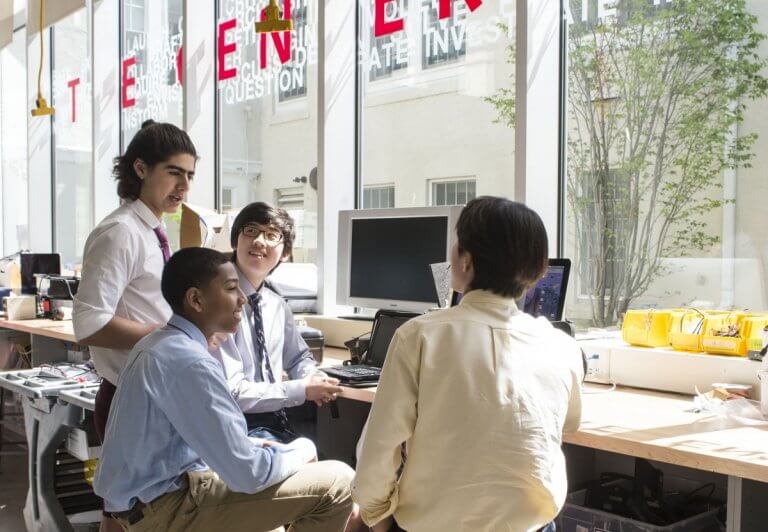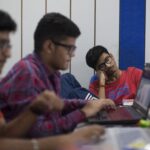
“Innovation to us is essentially creativity distilled down to its ultimate foundation, and so we talk a lot with our students about creating things that don’t already exist…imagination is a big word we like to use here.” – Curt Lewellyn, Director of the Ciongoli Center for Innovation, Fessenden School
Whichever way you turn, the world is abuzz with unique ideas and invigorating concepts. Fresh business ventures, products and services are transforming the world as we know it, with start-up culture and ingenuity breathing life into a connected, global society.
Millennials and Gen Z are engaged and inspired, united in their long-term passion for entrepreneurship and quest for innovation. As graduates, our children will enter a world of fast-paced change and modernization; a space in which disruptive technologies rewrite the rules of business, economics, politics and law.
These developments are set to improve our progressive and global community, but if they are to stay ahead of the curve, students must prepare for ever-evolving industry demands by perfecting and embracing the art of innovation.
From enterprising start-ups to inventive engineers and tech-savvy corporate moguls, innovation represents the pinnacle of contemporary success.
“Fact is, many jobs that don’t even exist now will be career paths that our students need to prepare themselves for. The key is in being a flexible learner; in being able to think in a way that computers simply can’t.”
Unveiled in 2016, the center encompasses 2,400 square feet dedicated to student innovation, described as the physical and ideological heart of Fessenden’s Massachusetts campus. Stocked with 3D printers, laser cutters, a collaboration classroom and a vast array of hi-tech tools, students here have all they need to set innovation alight.
“The primary goal of the center is instilling in our students a sense of ownership and creativity,” Lewellyn explains.
“Many people view centers like this as ‘technology hubs’, and while we do emphasize tools and applications, and we teach things like programming and robotics, we stress that this is really about building creative muscle over technical skill. And so, a lot of what we’re trying to do is see where the realm of ideas meets technical expertise.”
Students here gain access to an innovation network that includes some of the nation’s most prestigious institutions.
NuVu is one such example. Located in Cambridge, NuVu is described by Lewellyn as an “innovation school in and of themselves”. Established by graduates of MIT – a university consistently ranked the world’s most elite – this invaluable partnership gives students a taste of real-world innovation success.
But the center also comprises three expansive makerspaces and a state-of-the-art machine room. Placed next to Fessenden’s well-stocked library, the center is an impressive addition to the school’s 21st century learning resources, presenting an empowering space in which both faculty and students can advance their knowledge and expertise.
“Here at Fessenden, we talk a lot about the ‘Six Cs’ – critical thinking, communication, collaboration, creativity, character, and cross-cultural competency,” says Lewellyn.
“These principles are at the core of all curricula we’ve designed. Because of this, we are in every way ahead of the curve.”
Through classroom activities, cross-divisional collaboration, and “Innovation Station” Extended Day Program offerings, Fessenden’s Lower School boys (from Pre-K to Grade 4) are introduced to—and develop—these critical skills.
Learning opportunities truly know no bounds in this versatile and imaginative environment.
Exposure to this state-of-the-art facility ensures that boys are familiar with complex maker concepts, including programming, robotics, engineering, multimedia and design. It’s a space where boys learn to use these tools safely and confidently, preparing them for the more advanced opportunities they’ll have in the Ciongoli Center once they reach the Middle and Upper School years (Grades 5 to 9).

Source: The Fessenden School
There’s nothing better than hearing tales of former students who’ve gone into the world and thrived. Recently, Lewellyn got speaking to a Fessenden graduate, now studying at Beaver Country Day School, who continues to develop and hone an idea for a cryptocurrency generation system – a concept that started at the Ciongoli Center.
“It’s stories like this that make parents and students think, “okay, they’re in good hands and they’ll make a big impact”. It’s very moving. I love hearing stories like that,” he says.
Lewellyn explains how he and former Head of School, Dave Stettler, had a vision for this space. They thought a lot about metacognition, lifelong learning, and of course, what will be considered important in the future students will be launched into.
“Stettler, along with our former board member, Charles Fidel, emphasized ‘VUCA World, with VUCA meaning Volatility, Uncertainty, Complexity, and Ambiguity. That’s what we can count on for sure – complete uncertainty.”
So how do you design a curriculum with that in mind? It’s a terrifying prospect to a lot of educators, and it’s extremely exciting to others.
“I happen to fall into the latter category,” Lewellyn concludes.
“What we’re teaching in here is the ability to adapt quickly. Think about disruptive technologies and automation, and how business and the world is changing so quickly. What becomes necessary is the ability to gauge the wind and adjust your sails quickly.
“What we’re trying to do is create learners who are compelled by problems; students who look at a challenge and think, ‘Oh, cool!’ When you consider the problems the world is facing, you can see why the center and the concept of innovation are both incredibly important today.”
Follow The Fessenden School on Facebook, Twitter, YouTube, Pinterest and Instagram
Liked this? Then you’ll love…
Fulfil your ambitions at Worcester Academy
5 global schools embracing Integrative International Education







